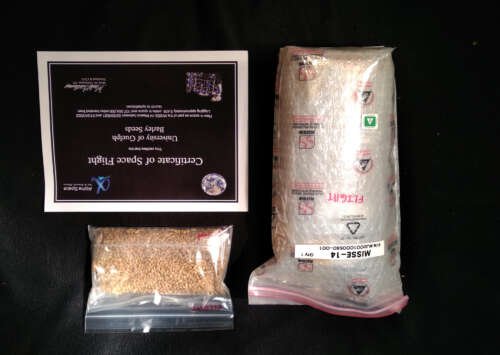
What goes up must come down. That rings true for physics and for a batch of barley seeds University of Guelph scientists sent to space last year.
Now that the seeds provided by The Glenlivet have returned to Earth, Dr. Mike Dixon, a professor in the School of Environmental Sciences and director of the Controlled Environment Systems Research Facility, is overseeing their germination.
After exposure to the extreme temperatures on the MISSE platform outside the orbiting International Space Station (ISS), the seeds’ ability to germinate is the successful step Dixon did not initially foresee but had hoped for.
“We did not expect them to survive,” he said, noting the exposure to zero gravity and temperatures ranging from –200 C to 200 C. Their location on the underside of the platform meant the seeds were “always in the shadow of elements of the platform” and therefore able to withstand the conditions, Dixon said.
Preliminary data in laboratory tests showed the barley seeds can survive at –200 C, but the upper temperature limit was 50 C. Since the seeds are still viable, this limit was not exceeded.
A good portion of The Glenlivet barley seeds are now planted in test beds says Jayne Murphy, marketing director: “We are always looking for new ways to innovate our single malt production and by partnering with the University of Guelph on their trailblazing space experiment, we had the opportunity to do exactly that. We are excited to see how the seeds will perform as they are planted, harvested, malted and distilled into one of our iconic single malts. We hope it will produce a new extra-terrestrial express with a wonderful taste.”
Barley seeds in space a collaboration with Aegis Aerospace and The Glenlivet

Thousands of seeds went to space in May 2021 in a SpaceX rocket, an endeavour that included U of G, the Aegis Aerospace Inc. and The Glenlivet, which provided the barley seed.
Success germination echoes the success of Tomatosphere™, an ongoing STEM (science, technology, engineering and mathematics) project founded by Dixon, retired Canadian astronaut Bob Thirsk and other partners that has sent tomato seeds to space for two decades.
Those seeds also germinated following their return to the surprise of Dixon, who has been researching how to grow food crops in controlled environment conditions for more than 25 years.
The returned tomato seeds are distributed to children across schools in Canada and the U.S., helping them learn about space science.
U of G scientists work toward goal of growing plants and crops in space
Developing low-pressure plant growth chambers to mimic the conditions crops would encounter in space, Dixon and his team have also researched how to grow everything from lettuce to strawberries to cannabis beyond Earth’s stratosphere.
They aim to enable astronauts to grow their own plants and crops, ensuring access to fresh produce while on long-term missions, as well as providing clean water captured from the transpiration process, providing oxygen and removing carbon dioxide.
The return of the barley seeds now sets the stage for further research to be conducted in other areas of space biology for future generations, Dixon said. “We’re planning to grow barley on the moon.”
While some seeds returned to U of G, many were also sent to Chivas, the world-renowned whisky maker, to eventually be malted and distilled by the Glenlivet distillery in Scotland.
As the distillery continues its mission, Dixon — a longtime Scotch lover who earned his PhD through the University of Edinburgh — said, “in the meantime, we are continuing with the science.”
Created by George Smith in 1824, The Glenlivet is the Original Speyside single malt, renowned for its heritage among single malts. The Glenlivet has contributed the biggest volume grown of the single malt category worldwide, adding more than any other single malt whisky brand over the past 10 years.
Contact:
Dr. Mike Dixon
mdixon@uoguelph.ca
